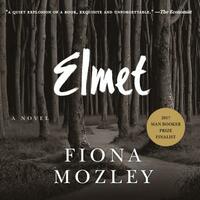Take a photo of a barcode or cover
Elmet is a beautifully written book about an unconventional family of 3 - siblings Daniel, Cathy, and their father John. John is a prize fighter who despises the modern way of life, and believes in living off of the earth, and this is how he teaches his children to live. They hunt and forage and make a life for themselves. But one cannot be completely isolated from civilization, so John lends his strength to whoever pays for it so that he can make money, and the children can get some rare treats.
Their self sufficient life is threatened when Price, a local landowner, claims the land they live on, and demands rent and services from John for allowing them to live on his land. This rubs John the wrong way, and gradually, he ends up facilitating a revolt of sorts against Price and his cronies. But the common man can fight the machine only so long, and John, Cathy and Daniel find their lives unravelling before long.
This is a story of class, revenge, gender roles, poverty and the increasing encroachment of "modernization" into the simple lives of people who live off the land. John is the poster child for self sufficiency, and this does not sit well in a society where the upper class squeeze utility out of the lower classes. John fights, and fights hard, but eventually, the system wins.
Similarly, Cathy and Daniel, brought up without the external references of gender roles to guide them, have grown up free to be themselves. Cathy, who takes after her father, is a strong, independent and violent girl who does not go down without a fight and is not ashamed to call out people for doing wrong. Daniel, on the other hand, has long hair, a pretty face and prefers the indoors, where he cooks for the family and cleans up after them. When they are suddenly thrown into the world where a girl has to behave a certain way and a boy a certain other way, they get confused and disoriented.
Poverty, revenge and other motifs are explored very intricately in the book, and the author paints a very bleak picture of the life that would follow for Daniel after the events that unfold in the book. However, the prose is beautiful, and the imagery is striking - it is almost like we smell the wood fires and feel the wind that the characters feel.
My only criticism of the book would be that other than the main trio, the remaining characters seemed a bit stereotypical, but considering the fact that this was a debut novel, this does not detract from the experience of enjoying the book at all.
A great, if slightly depressing, read.
Their self sufficient life is threatened when Price, a local landowner, claims the land they live on, and demands rent and services from John for allowing them to live on his land. This rubs John the wrong way, and gradually, he ends up facilitating a revolt of sorts against Price and his cronies. But the common man can fight the machine only so long, and John, Cathy and Daniel find their lives unravelling before long.
This is a story of class, revenge, gender roles, poverty and the increasing encroachment of "modernization" into the simple lives of people who live off the land. John is the poster child for self sufficiency, and this does not sit well in a society where the upper class squeeze utility out of the lower classes. John fights, and fights hard, but eventually, the system wins.
Similarly, Cathy and Daniel, brought up without the external references of gender roles to guide them, have grown up free to be themselves. Cathy, who takes after her father, is a strong, independent and violent girl who does not go down without a fight and is not ashamed to call out people for doing wrong. Daniel, on the other hand, has long hair, a pretty face and prefers the indoors, where he cooks for the family and cleans up after them. When they are suddenly thrown into the world where a girl has to behave a certain way and a boy a certain other way, they get confused and disoriented.
Poverty, revenge and other motifs are explored very intricately in the book, and the author paints a very bleak picture of the life that would follow for Daniel after the events that unfold in the book. However, the prose is beautiful, and the imagery is striking - it is almost like we smell the wood fires and feel the wind that the characters feel.
My only criticism of the book would be that other than the main trio, the remaining characters seemed a bit stereotypical, but considering the fact that this was a debut novel, this does not detract from the experience of enjoying the book at all.
A great, if slightly depressing, read.
A story about land, and class, and family.
Extremely well-written. Very sad. :(
Extremely well-written. Very sad. :(
3.5 stars. beautiful descriptions of nature and how the main character, Daniel, relates to others in his family, but I felt some parts of the ending were either far too wordy (characters talking for far too long) or just not clear or logical. Otherwise, a good read with well-designed tension that rises throughout the book.
Nordengland in der Jetztzeit. Die Teenager Daniel und Cathy leben mit ihrem Vater in einer selbstgebauten Hütte auf dem Land. Sie haben nur wenige Nachbarn, haben die Einsamkeit und Zurückgezogenheit gezielt gesucht. Sie sind zufrieden, bis der größte Grundbesitzer der Region Rechte an ihrem Grundstück bekundet und die Vergangenheit und die Gegebenheiten der Region beginnen, die Familie einzuholen.
Mehr als einmal kam mir bei der Lektüre von Fiona Mozleys Debütroman der Gedanke, dass die Gegend, in der er angesiedelt ist, und die rauen Sitten, die dort herrschen, mich an die Ozarks und an Daniel Woodrells „Winter’s Bone“ erinnern. Das Gesetz, die Staatsgewalt scheinen nicht vorhanden, niemand bemängelt, dass Daniel, der Ich-Erzähler des Romans, und seine Schwester nicht mehr zur Schule gehen. Stattdessen schickt der Vater sie zu einer etwas besser gebildeten Nachbarin, um ihnen eine Art Unterricht zukommen zu lassen. Und Grundbesitzer Price nimmt die Rolle eines Königs ein, der das Sagen hat und gegen den niemand ankommt, die Polizei hinzuzuziehen, ist nicht denkbar oder die Polizisten stehen ebenfalls unter seiner Fuchtel. Daniel ist das Gegenstück seines grobschlächtigen Vaters, der früher als Boxer sein Geld verdient hat, er ist zierlich, feminin und scheint sich auch so zu fühlen. In seiner Familie und seinem Umfeld ist dies überhaupt kein Thema, er ist jedoch auf den Schutz seines Vaters und auch seiner nur wenig älteren Schwester angewiesen. Diese ist eher burschikos und trägt stark fatalistische Züge, sie nimmt vieles, was man ihr angetan hat, als gegeben hin, kann sich jedoch durchaus wehren. Umgehauen hat mich dieser Satz aus ihrem Mund:
„We all grow into our coffins, Danny. And I saw myself growing into mine.“
Für mich war es schwer erträglich, mitzuerleben, wie die Ungerechtigkeit und die Selbstjustiz sich in Mozleys Geschichte ihren Weg bahnen. Man möchte eine Polizeitruppe hinschicken, erkennt aber, das dies aus der Sicht der Charaktere unsinnig ist. Was den Leser wiederum ohnmächtig, verzweifelt hinterlässt. Es ist kaum vorstellbar, dass herrisches Gebaren wie das von Price heute noch durchgeht, doch, halt, wie lautet der Titel des Buchs? „Elmet“: eine Gegend in Nordengland, die im frühen Mittelalter, in den „Dark Ages“, ein eigenständiges keltisches Königreich war. Und so scheinen die alten Kräfte, die totalitären Strukturen in Elmet weiterzubestehen, unbeirrt von der modernen Zeit.
Elmet ist ein erstaunliches Debüt, ein kraftvolles, aufwühlendes und sprachlich starkes Buch, das ich durchaus gern als Gewinner des Booker Prize sehen würde, auch wenn ich wie die meisten vermute, dass „Autumn“ von Ali Smith gewinnen wird.
Mehr als einmal kam mir bei der Lektüre von Fiona Mozleys Debütroman der Gedanke, dass die Gegend, in der er angesiedelt ist, und die rauen Sitten, die dort herrschen, mich an die Ozarks und an Daniel Woodrells „Winter’s Bone“ erinnern. Das Gesetz, die Staatsgewalt scheinen nicht vorhanden, niemand bemängelt, dass Daniel, der Ich-Erzähler des Romans, und seine Schwester nicht mehr zur Schule gehen. Stattdessen schickt der Vater sie zu einer etwas besser gebildeten Nachbarin, um ihnen eine Art Unterricht zukommen zu lassen. Und Grundbesitzer Price nimmt die Rolle eines Königs ein, der das Sagen hat und gegen den niemand ankommt, die Polizei hinzuzuziehen, ist nicht denkbar oder die Polizisten stehen ebenfalls unter seiner Fuchtel. Daniel ist das Gegenstück seines grobschlächtigen Vaters, der früher als Boxer sein Geld verdient hat, er ist zierlich, feminin und scheint sich auch so zu fühlen. In seiner Familie und seinem Umfeld ist dies überhaupt kein Thema, er ist jedoch auf den Schutz seines Vaters und auch seiner nur wenig älteren Schwester angewiesen. Diese ist eher burschikos und trägt stark fatalistische Züge, sie nimmt vieles, was man ihr angetan hat, als gegeben hin, kann sich jedoch durchaus wehren. Umgehauen hat mich dieser Satz aus ihrem Mund:
„We all grow into our coffins, Danny. And I saw myself growing into mine.“
Für mich war es schwer erträglich, mitzuerleben, wie die Ungerechtigkeit und die Selbstjustiz sich in Mozleys Geschichte ihren Weg bahnen. Man möchte eine Polizeitruppe hinschicken, erkennt aber, das dies aus der Sicht der Charaktere unsinnig ist. Was den Leser wiederum ohnmächtig, verzweifelt hinterlässt. Es ist kaum vorstellbar, dass herrisches Gebaren wie das von Price heute noch durchgeht, doch, halt, wie lautet der Titel des Buchs? „Elmet“: eine Gegend in Nordengland, die im frühen Mittelalter, in den „Dark Ages“, ein eigenständiges keltisches Königreich war. Und so scheinen die alten Kräfte, die totalitären Strukturen in Elmet weiterzubestehen, unbeirrt von der modernen Zeit.
Elmet ist ein erstaunliches Debüt, ein kraftvolles, aufwühlendes und sprachlich starkes Buch, das ich durchaus gern als Gewinner des Booker Prize sehen würde, auch wenn ich wie die meisten vermute, dass „Autumn“ von Ali Smith gewinnen wird.
dark
tense
medium-paced
Plot or Character Driven:
A mix
Strong character development:
Yes
Loveable characters:
Yes
Diverse cast of characters:
Yes
Flaws of characters a main focus:
Yes
A brutal examination of how power is derived from possession, and how the only course of action open to those without it is a form of self-harm or outright self-destruction.
A slow-burning, quietly furious novel bubbling beneath beautiful prose. It's a short work but each word is selected so carefully that it feels like an epic.
emotional
reflective
medium-paced
Strong character development:
Yes
Loveable characters:
Complicated
Diverse cast of characters:
No
Flaws of characters a main focus:
N/A
I liked the characters in the book. Those we needed to know were well developed. But there were those who were only meant to be superficial. This book kept me interested, and I read it quickly. Two weeks which is a fast read for me. It was a printed book, not an ebook. I reserve ebooks for big, many paged books.
I really loved a large chunk of this book but something got lost in the fray of the latter third. I think that something was it's own craft, as a unique voice eventually gives way to driving plot and stock style. Well worth a read all the same.
3.5
3.5
Short-listed for the Booker prize and the author's debut novel, it's quirky factor and unusual family reminds me of another Booker prize nominee this year, "History of Wolves" by Emily Fridlund, another debut author.
Both are not for the light reader, but are worth the time and effort.
Both are not for the light reader, but are worth the time and effort.
I wanted to love this book much more than I did. It was recommended to me right after I finished "History of Wolves" (which I absolutely adored), so I was excited to read it. It didn't really pick up for me until about a quarter of the way through, and while the story and characters were compelling, I just felt like there was something missing in the overall structure and storytelling. The last quarter-ish of the book flew by because stuff really started to pick up and get exciting, and then it ended. There were definitely parts of it I really enjoyed but overall, it wasn't my favorite.





